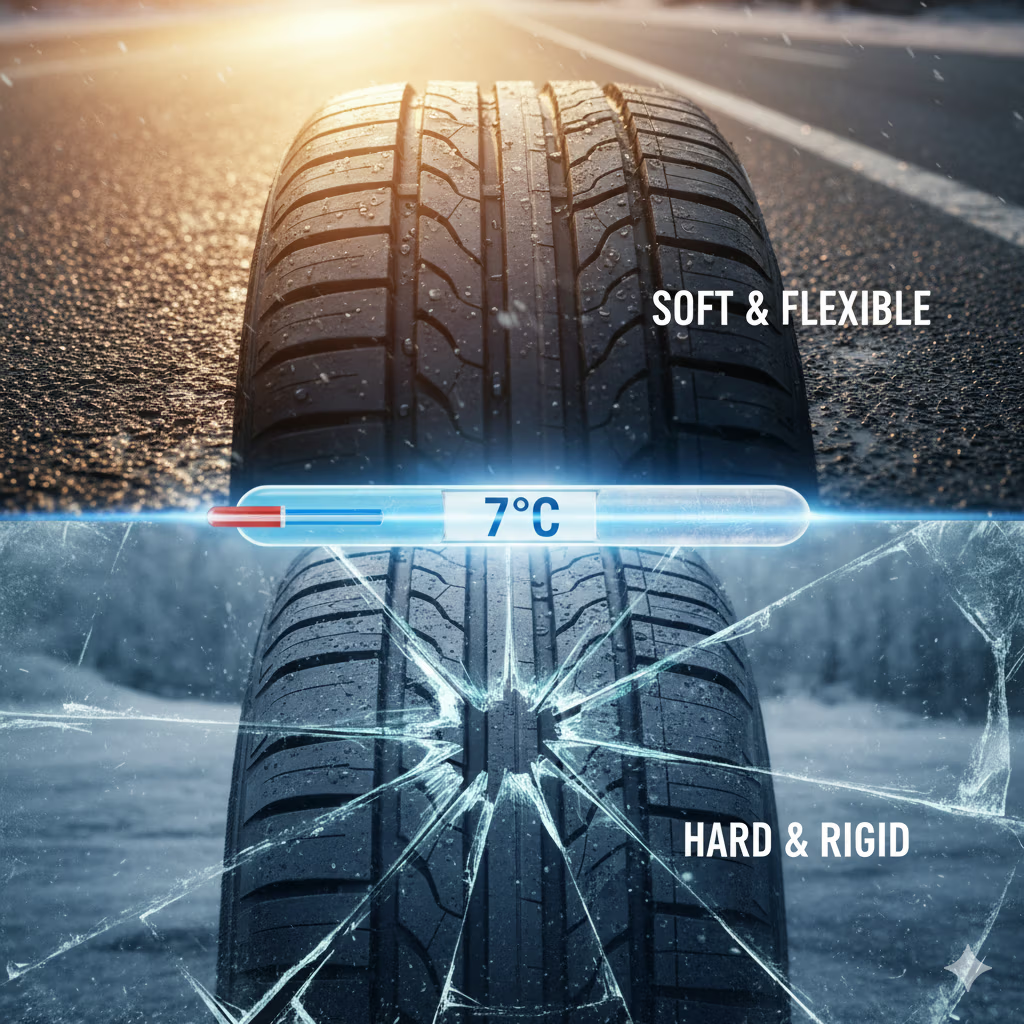The tires that came with your vehicle are likely labeled “All-Season.” It’s a comforting term that suggests they are ready for anything the calendar throws at them—from the heat of summer to the chill of winter. However, for drivers on the Vancouver North Shore and across Canada, relying on All-Season tires when the mercury drops is a critical safety gamble.
Simply put, the “All” in All-Season is a marketing myth. When it comes to real winter driving conditions, these default tires are fundamentally unequipped for the job.
The 7∘C Truth: Where All-Season Fails
The most crucial factor in tire safety is not snow or ice—it’s temperature.
The scientific cutoff for tire performance is 7∘C (about 45∘F). When the outdoor temperature consistently falls below this point, your All-Season tires lose their most essential function: grip.

1. The Rubber Compound Hardens
All-Season tires are made from a harder rubber compound that is optimized for durability and longevity in warm conditions.
- In Warmth: The rubber is flexible and sticky, conforming to the pavement for excellent traction.
- Below 7∘C: This compound stiffens dramatically. The tire turns rigid, losing its elasticity. Imagine trying to run on ice with shoes that have hard plastic soles—they simply can’t grip. This loss of flexibility translates directly to reduced steering control and significantly longer braking distances.
2. Lack of Specialized Tread Design
The treads on All-Season tires are designed primarily for moving water (rain) and providing a quiet, comfortable ride. They are not built for winter’s challenges:
- No Snow Evacuation: Their shallower, simpler grooves pack full of snow and slush quickly. This eliminates traction, essentially turning the tire into a slick, rolling snowball.
- No Biting Edges (Siping): All-Season tires lack the intricate network of tiny, razor-thin slits—called sipes—that are found on winter tires. These sipes act like hundreds of small claws, opening up to bite into the micro-layer of water on top of ice, which is the secret to winter traction.
The Only Two Safe Choices for a North Shore Winter
For anyone who drives on the steep inclines and often-icy microclimates of the North Shore, there are only two safe tire categories for the cold season:
A. Dedicated Winter Tires
These are the gold standard for safety. They are made from a high-silica rubber compound that stays soft and flexible even in extreme sub-zero temperatures. Their deep, jagged treads are engineered to channel massive amounts of snow and slush, providing the shortest possible stopping distances on ice and packed snow.
B. All-Weather Tires
This is the true “year-round” tire. All-Weather tires bridge the gap. Their key difference from All-Season tires is that they are certified with the Three-Peak Mountain Snowflake (3PMSF) symbol. This certification guarantees they have passed rigorous testing and use a compound flexible enough to retain grip below 7∘C. They offer reliable winter performance without the need for seasonal swaps.
The Critical Marker: Look for the Snowflake
If a tire is safe for winter, it will have the Three-Peak Mountain Snowflake (3PMSF) symbol on its sidewall. If your tires only say M+S (Mud and Snow), they are All-Season, and they are not optimized for severe winter driving.
Making the Change Easy on the North Shore
We understand that for busy Vancouver North Shore residents, finding the time to sit in a tire shop waiting room for a seasonal changeover is a major headache. The good news is that this inconvenience is now completely avoidable.
A local innovation in the mobile service economy is solving this problem: mobile tire installation.
Forget the scheduling hassle and the time wasted at a traditional garage. A mobile tire service brings the entire shop—from mounting and balancing equipment to expert technicians—right to your home or office.
For drivers ready to prioritize safety and convenience this winter, companies like The Tire Valet offer a premium service where they perform your winter tire change at your home on the Vancouver North Shore. This eliminates the last major barrier to driving safely in the cold—the inconvenience of the shop visit.
Don’t compromise your safety or that of your family on the dangerous myth of “All-Season” tires. Check your tires for the Snowflake symbol, and if it’s not there, book a changeover before the temperature dips below 7∘C.
Need a hassle-free solution for your winter tire change? The Tire Valet is a premier mobile tire service that comes directly to you on the Vancouver North Shore. Schedule your service today to ensure your vehicle is winter-ready without ever leaving your home: TheTireValet.ca















